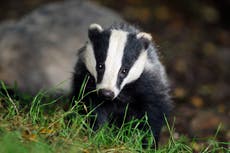Government criticised for ‘outrageous’ U-turn on badger cull as fresh plans revealed
Exclusive: Consultation to start within weeks after estimated half British population of protected species wiped out
The government is set to backtrack on long-promised plans to stop culling badgers after 2025, as part of efforts to tackle tuberculosis (TB) in cattle.
Ministers had pledged to phase out the badger cull in two years’ time, instead focusing on vaccination of both badgers and cattle and tightening cattle biosecurity.
Last year was officially the final one in which four-year licences were issued.

But now environment chiefs are preparing to consult within weeks on fresh proposals to include killing the native mammals “on a targeted basis”, alongside other disease-control measures.
The Badger Trust, which disputes the effectiveness of the cull in containing bovine TB, condemned the decision as “outrageous”.
A letter from rural affairs minister Richard Benyon, seen by The Independent, states: “We are now transitioning towards large-scale badger vaccination to create a more resilient wildlife population and reduce our reliance on blanket culling.”
The government is developing proposals for a “targeted, cluster-based approach” to disease control, the letter says.
“Both badger vaccination and badger culling will have a role to play in this; they are complementary eradication tools, especially when underpinned by enhanced wildlife surveillance.
“As such, there would continue to be provision for culling on a targeted basis, where epidemiological evidence suggests this is appropriate.
“We have not yet consulted on these proposals. Subject to ministerial agreement, we plan to do so in the autumn of 2023.”
This toxic policy is an assault on nature in a timescale unprecedented in our history
The letter says the Department for Environment, Food and Rural Affairs (Defra) aims to have a usable cattle vaccine in the coming years but no vaccine is yet available and trials are still being carried out.
“The badger cull has led to a significant reduction in the disease in cattle, but no one wants to continue the cull of a protected species indefinitely,” Lord Benyon says.
However, Peter Hambly, executive director of the Badger Trust, claimed the government was using badgers as a scapegoat for not taking “more decisive” cattle-based action on bTB.
“They don’t test the thousands of badgers they kill each year, yet they only cull cattle proven to have the disease.
“They have killed half of the country’s badgers in little more than a decade with scant evidence that they are even carrying bTB, and now have plans to kill even more.
“This toxic policy is an assault on nature in a timescale unprecedented in our history.
“The plans to consult on more badger culling, despite previously saying they would stop in 2025, is outrageous – they are obsessed with culling badgers.”
Since the cull began in 2013, an estimated 210,000 badgers – a protected species – have been wiped out.
Latest government statistics show that between April 2022 and March this year, 20,228 cows were slaughtered because of bTB.
Mr Hambly said more effective bTB control involved better cattle testing and vaccination, enhanced biosecurity and controlling cattle movements.
He said there were reports badgers had become extinct in some high-cull areas such as Gloucestershire and Somerset.
A study earlier this year in Northern Ireland found that cows were 800 times more likely to pass bTB to badgers than badgers were to cattle.
He added that numbers of badgers shot while free running – rather than trapped – had increased to nearly nine out of 10. The practice leaves injured animals at risk of dying slowly from their wounds and infection, experts say.
A Defra spokesperson added to Lord Benyon’s comments, saying: “Building on the progress made, we are now able to move onto the next phase, including wider badger vaccination, alongside improved cattle testing and work towards deployment of a cattle vaccine.”




Join our commenting forum
Join thought-provoking conversations, follow other Independent readers and see their replies
Comments